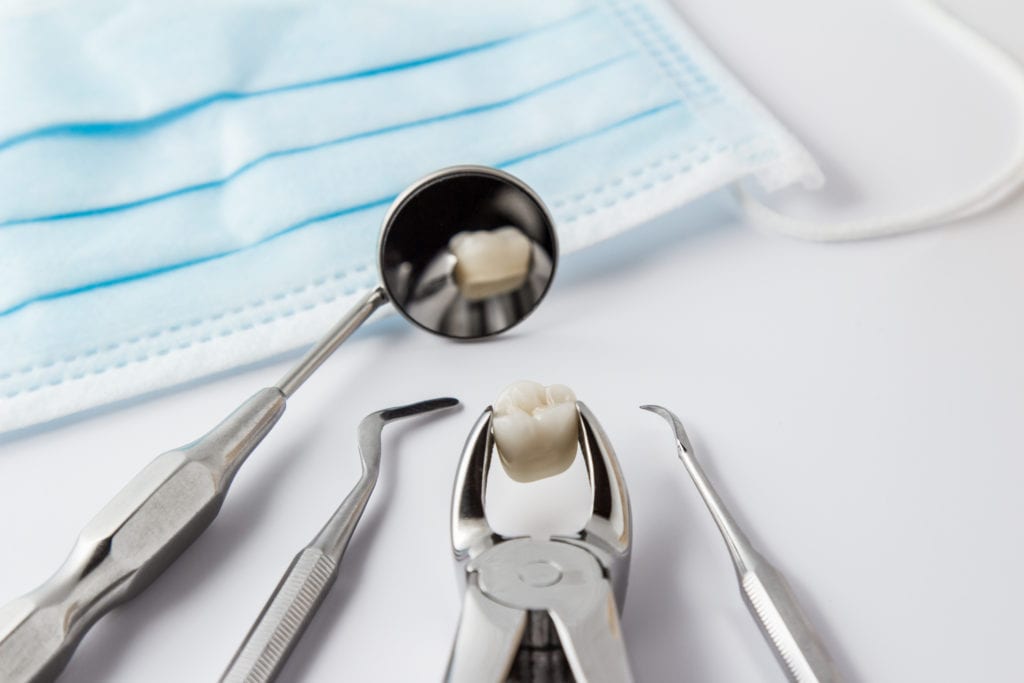Do you have impacted wisdom teeth? We provide tooth extraction treatment in our Suffolk, VA dental office. At Gwaltney Dental, Dr. Whitney Gwaltney, Steve Gwaltney, and Dr. J. Ryland Gwaltney offer general dentistry treatments to help maintain the health of the teeth and gums. We extract teeth when severely infected, damaged, or overcrowded. We can also remove impacted teeth that can cause pain for some patients.
When Do I Need a Tooth Extraction?
If you have an infection or tooth decay, seeing a dentist as soon as possible is essential. If dental plaque accumulates in the area, it could further damage your teeth and gums. We do our best to try and save the tooth from extraction before recommending this treatment. There are several reasons why patients require tooth extraction treatment, including:
Cavities
Cavities are caused when bacteria erode the enamel and infect the pulp within the tooth chamber. Root canal treatment can remove this infection and reseal the tooth with a dental filling. However, it must be removed if the tooth is severely infected and weakened.
Orthodontic treatment
Overcrowded teeth affected by malocclusion, also known as tooth misalignment, may require the extraction of one tooth to make space for the remaining teeth. Tooth extraction treatment is needed for more severe cases of malocclusion and overcrowding. Then, patients can undergo orthodontic care.
Wisdom tooth extraction
The wisdom teeth are also known as third molars and are the last teeth to emerge. Impacted wisdom teeth occur when the teeth do not have enough room to emerge. This can cause pain and even infection. We suggest that patients with painful wisdom teeth receive tooth extraction treatment.

Tooth Extraction Treatment at Gwaltney Dental
Some patients may think a tooth extraction is painful, but we will numb the area for pain-free treatment. The extraction itself usually lasts around 10 minutes. During the extraction procedure, we loosen the tooth gently and then remove it. The dentist will numb the area and remove the tooth with forceps. We clean the gums and bone and cover them with stitches if necessary. Then, we pack the socket with gauze.
We recommend that patients eat soft foods and apply an ice pack to the side of their face to combat swelling. Patients can also brush and floss regularly but take care to avoid the socket.
Replacing Teeth After Extraction
Most dentists agree that a dental implant-supported restoration is the best way to replace a missing tooth. After tooth extraction treatment, we can easily replace an extracted tooth with a single dental implant. We will place a temporary crown on the tooth for aesthetic purposes when necessary. Before a permanent crown is secured, the implant will need about three to six months to fuse with the surrounding bone.
If you have several teeth extracted, we can replace them with multiple dental implants and a bridge or denture.
Tooth Extraction Aftercare
Taking care of your mouth after a tooth extraction is very important. Proper aftercare can help you heal faster and avoid problems like infections or dry socket. T
Right After the Extraction
Your dentist will place a piece of gauze over the empty socket as soon as your tooth is removed. You will need to bite down on it gently but firmly. This helps stop the bleeding and lets a blood clot form. That clot is important—it protects the bone and nerves while your mouth heals. Keep the gauze in place for 30 to 45 minutes. If the area keeps bleeding, replace the gauze with a fresh piece and continue biting down.
Rest and Recovery
Plan to rest for the first 24 hours. Avoid physical activities like exercise, heavy lifting, or bending over. These actions can raise your blood pressure and make bleeding worse. Use pillows to prop up your head when lying down. Resting with your head elevated can help reduce swelling.
What to Avoid
For at least 24 to 48 hours, do not drink from a straw, smoke, or rinse your mouth forcefully. These actions can dislodge the blood clot and cause dry socket, a painful condition that slows healing. Also, avoid drinking alcohol or hot drinks like coffee and tea. Stick to cool or room-temperature liquids, and eat soft foods like yogurt, applesauce, or mashed potatoes.
Managing Pain and Swelling
It is normal to have some pain and swelling after the extraction. Your dentist may prescribe pain medicine or recommend over-the-counter pain medicine like ibuprofen. To reduce swelling, use an ice pack on your cheek for 15 to 20 minutes at a time during the first day. After 24 hours, gently rinse your mouth with warm salt water a few times daily to keep the area clean.
Keeping the Area Clean
Do not brush directly over the socket for the first few days, but you can gently brush the rest of your teeth. Rinsing with salt water helps keep the area free of bacteria. Mix salt into a glass of warm water and swish gently, especially after eating.
If bleeding continues for more than a day, or if you have a fever, severe pain, or swelling that gets worse, contact us right away. These could be signs of infection or other complications.
Tooth Extraction FAQs
There are many different types of tooth extraction. Learn more by reading the answers to these commonly asked questions.
What should I avoid after tooth extraction?
After tooth extraction, we recommend avoiding foods that are difficult to chew. We also recommend avoiding particularly hot or cold drinks, which may cause sensitivity. Patients should refrain from drinking through a straw, which may cause a dry socket. They should also avoid smoking and any tobacco products, as this will slow healing.
What happens if you eat too soon after tooth extraction?
Eating too soon after a tooth extraction risks increased bleeding or dislodging the blood clot. This can make your recovery longer and more difficult. We recommend a soft diet for at least a few days after tooth extraction.
What are the restrictions after having a tooth extracted?
Avoid crunchy or hard meals over the first few days after an extraction. We recommend stocking up on soft foods like rice, pasta, eggs, yogurt, and applesauce. You should refrain from using straws because they might create dry sockets and dislodge blood clots.
How long do you need to rest after tooth extraction?
For the blood clot to form, we advise relaxing for 48 to 72 hours after tooth extraction. After the resting period, you can resume your usual physical activity. Your mouth’s soft tissue will fully recover in three to four weeks.
What day after tooth extraction hurts the most?
On days two and three following the extraction, the highest level of discomfort is often seen. Patients may eat once they get home and the bleeding has stopped. We recommend sticking to a soft diet until you feel comfortable chewing. To reduce discomfort, patients may take an OTC pain reliever such as ibuprofen/acetaminophen after eating.
What helps gums heal faster after extraction?
After tooth extractions, the most important thing to do is rest. Rest is crucial to helping the body heal. Patients should also stick to a soft diet after extraction and avoid smoking or drinking through a straw for at least two weeks following the procedure. Smoking or drinking through a straw can cause dry sockets, which may cause significant pain.
Request A Dental Exam Today
Remove infected, painful, or overcrowded teeth with comfortable care in our Suffolk, VA office. Schedule a consultation with one of our dentists online or call us at 757-982-8467.

